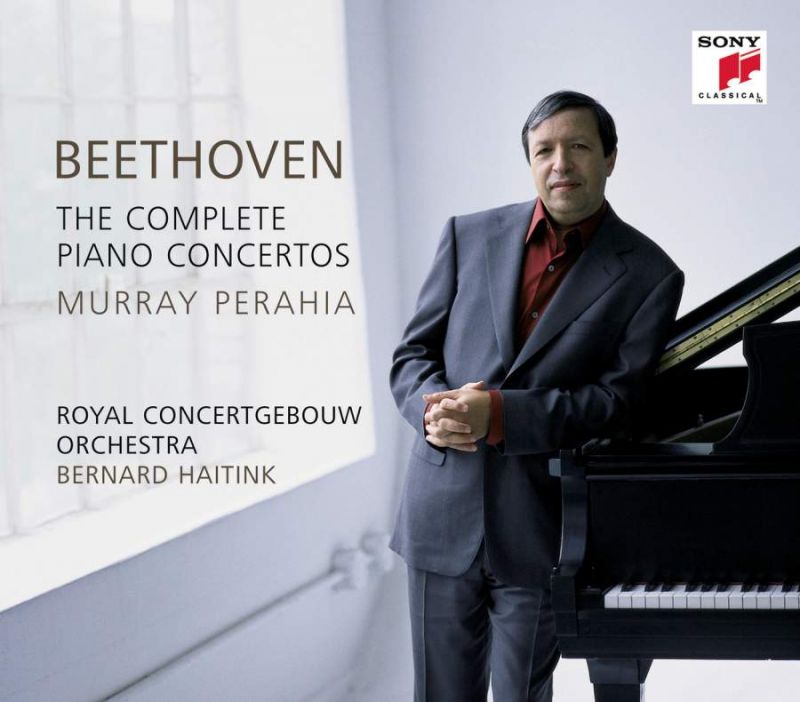Beethoven (The) Complete Piano Concertos
Clarity and elegance are the Perahia hallmarks in this ‘middle way’ set
View record and artist detailsRecord and Artist Details
Composer or Director: Ludwig van Beethoven
Genre:
Orchestral
Label: Sony Classical
Magazine Review Date: 10/2007
Media Format: CD or Download
Media Runtime: 0
Mastering:
Stereo
DDD
Catalogue Number: 88697 10290-2

Tracks:
| Composition | Artist Credit |
|---|---|
| Concerto for Piano and Orchestra No. 1 |
Ludwig van Beethoven, Composer
(Royal) Concertgebouw Orchestra, Amsterdam Bernard Haitink, Conductor Ludwig van Beethoven, Composer Murray Perahia, Piano |
| Concerto for Piano and Orchestra No. 2 |
Ludwig van Beethoven, Composer
(Royal) Concertgebouw Orchestra, Amsterdam Bernard Haitink, Conductor Ludwig van Beethoven, Composer Murray Perahia, Piano |
| Concerto for Piano and Orchestra No. 3 |
Ludwig van Beethoven, Composer
(Royal) Concertgebouw Orchestra, Amsterdam Bernard Haitink, Conductor Ludwig van Beethoven, Composer Murray Perahia, Piano |
| Concerto for Piano and Orchestra No. 4 |
Ludwig van Beethoven, Composer
(Royal) Concertgebouw Orchestra, Amsterdam Bernard Haitink, Conductor Ludwig van Beethoven, Composer Murray Perahia, Piano |
| Concerto for Piano and Orchestra No. 5, 'Emperor' |
Ludwig van Beethoven, Composer
(Royal) Concertgebouw Orchestra, Amsterdam Bernard Haitink, Conductor Ludwig van Beethoven, Composer Murray Perahia, Piano |
Author: Jeremy Nicholas
These highly praised recordings from the early 1980s are reissued in a hinged cardboard triptych with no booklet – just the three discs, with the 38'46" of the Emperor the sole occupant of the third. While anything that does not come in a plastic jewel case has to be welcomed, it seems an odd decision to present these five masterpieces in this form. Why? Because the performances provide an ideal “middle way” introduction to them and anyone coming to them for the first time might have expected to find out something of their history and compositional process (let alone about the distinguished artists who have gone to the trouble of committing them to disc) from a booklet.
Seasoned collectors will readily warm to the beautifully recorded piano even if the brass section is placed rather distantly in the empty concert hall ambience. That said, a wealth of often obscured orchestral detail emerges without any feeling of being artificially lit (the woodwind exchanges in the opening movements of the First and Second concertos, for example). There is something reassuring about the readings of all five concertos. The perfect civility of Perahia’s playing is a joy, the deeply felt slow movements particularly rewarding (try that of the Fourth, following the choice of the longer of the two cadenzas for the first movement).
But. While the Haydnesque qualities of the Second Concerto are well captured, should this character pervade the later First Concerto to the same extent? Elsewhere proceedings sometimes border perilously close to bland. The tempi for the final movements of Nos 3 and 4 are, at the least, on the safe side (the passionate release at the point of the latter’s coda erupts from nowhere). In the Emperor there are passages that one wishes were more, well, imperious. The soloist’s crown is certainly usurped at the end of the first movement and I missed the cushioned “plumf” of the basses in the Adagio, so well captured by the Philharmonia under Leopold Ludwig (Gilels’s 1957 recording) though Perahia offers a more sparkling Rondo.
“Played with clarity, elegance and rhythmic crispness,” opined the New York Times of this set and it would be hard to find another that bettered these qualities, but on occasion one would have welcomed a more robust, characterful response from all concerned.
Seasoned collectors will readily warm to the beautifully recorded piano even if the brass section is placed rather distantly in the empty concert hall ambience. That said, a wealth of often obscured orchestral detail emerges without any feeling of being artificially lit (the woodwind exchanges in the opening movements of the First and Second concertos, for example). There is something reassuring about the readings of all five concertos. The perfect civility of Perahia’s playing is a joy, the deeply felt slow movements particularly rewarding (try that of the Fourth, following the choice of the longer of the two cadenzas for the first movement).
But. While the Haydnesque qualities of the Second Concerto are well captured, should this character pervade the later First Concerto to the same extent? Elsewhere proceedings sometimes border perilously close to bland. The tempi for the final movements of Nos 3 and 4 are, at the least, on the safe side (the passionate release at the point of the latter’s coda erupts from nowhere). In the Emperor there are passages that one wishes were more, well, imperious. The soloist’s crown is certainly usurped at the end of the first movement and I missed the cushioned “plumf” of the basses in the Adagio, so well captured by the Philharmonia under Leopold Ludwig (Gilels’s 1957 recording) though Perahia offers a more sparkling Rondo.
“Played with clarity, elegance and rhythmic crispness,” opined the New York Times of this set and it would be hard to find another that bettered these qualities, but on occasion one would have welcomed a more robust, characterful response from all concerned.
Discover the world's largest classical music catalogue with Presto Music.

Gramophone Digital Club
- Digital Edition
- Digital Archive
- Reviews Database
- Full website access
From £8.75 / month
Subscribe
Gramophone Full Club
- Print Edition
- Digital Edition
- Digital Archive
- Reviews Database
- Full website access
From £11.00 / month
Subscribe
If you are a library, university or other organisation that would be interested in an institutional subscription to Gramophone please click here for further information.




